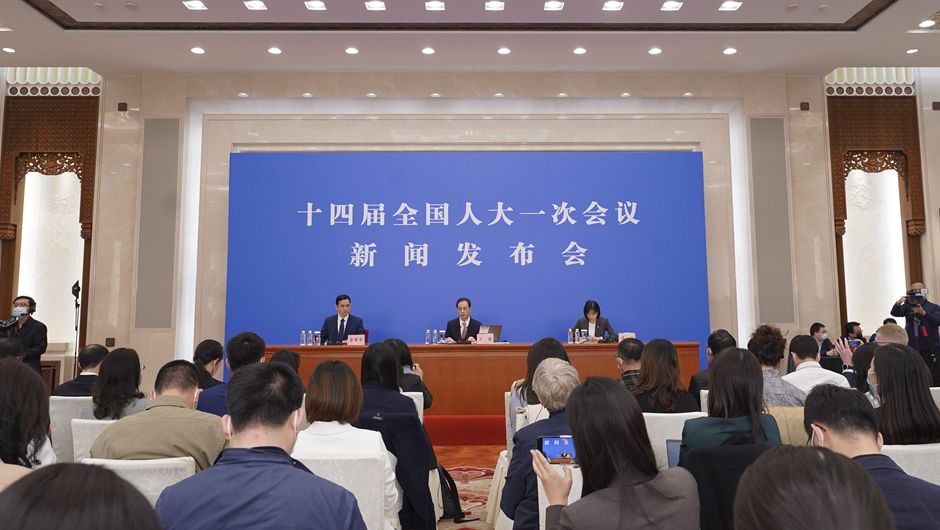
China's top legislature, the National People's Congress, holds a news conference at the Great Hall of the People in Beijing, ahead of the opening of its annual session, March 4, 2023. /Xinhua
China's top legislature, the National People's Congress, holds a news conference at the Great Hall of the People in Beijing, ahead of the opening of its annual session, March 4, 2023. /Xinhua
The first session of the 14th National People's Congress (NPC), China's national legislature, is set to open on Sunday morning and conclude on the morning of March 13, a spokesperson said on Saturday.
Apart from the reviewing of a series of reports including a government work report, NPC deputies will deliberate on a draft amendment to the Legislation Law and a plan on the reform of State Council institutions, Wang Chao, spokesperson for the session, said at a press conference in Beijing.
Members of state organs will be elected and decided upon during the session, Wang added.
Legislative work
Historic achievements were made by the 13th NPC Standing Committee in building a sound legal system, Wang said, adding that 47 new laws were formulated and 111 revisions to laws were adopted during its five-year tenure, while the channels for citizens to take part in legislation were expanded.
Wang said the Law on Safeguarding National Security in the Hong Kong Special Administrative Region (HKSAR), which was formulated and enacted by the 13th NPC, was an important milestone in the practice of "One Country, Two Systems."
He added that China's top legislature will continue to safeguard "One Country, Two Systems" and improve work to safeguard the constitutional order in HKSAR.
The spokesperson said the NPC's legislative work is a vivid manifestation of China's whole-process people's democracy and cited the establishment of legislative outreach offices as an example.
Through legislative outreach offices, which are directly associated with the standing committees of the people's congresses at all levels, people in China can express their expectations for future laws and offer relevant suggestions. The report to the 20th National Congress of the Communist Party of China urged efforts to ensure that local legislative outreach offices are run well.
Wang noted that the Legislative Affairs Commission of the NPC Standing Committee has established 32 local legislative outreach offices across the country, covering China's 31 provinces, autonomous regions and municipalities.
The top legislature's move has inspired standing committees of provincial and municipal people's congresses to establish more than 5,500 legislative outreach offices of their own, he added.
The legislative plan for the next five years is being made, and the priorities will be legislation in key and emerging areas as well as in areas related to foreign affairs, Wang said.
The Standing Committee of the 14th NPC plans to deliberate 35 bills this year, some of which will be submitted for the first hearing, he added.
China advocates common development
Wang said that China pledged to uphold world peace and promote common development, stressing it always abides by the basic principles of international law as well as the basic norms of international relations and stands firmly against "long-arm jurisdiction" practices.
The spokesperson said some countries have kept abusing the extraterritorial application of their domestic laws in violation of international law with the aim of suppressing foreign entities and individuals and serving their own interests, and added that China attaches great importance to enhancing the legal system with regard to further opening up.
The country is also unwaveringly committed to advancing the rule of law in safeguarding national sovereignty, security and development interests, he said.
According to Wang, the China-proposed Belt and Road Initiative (BRI) has become a public good and a cooperation platform that has been welcomed by the international community. He said over 150 countries and 30 international organizations have signed BRI cooperation documents.
Wang also refuted the claim that China is creating "debt traps" in Africa, stressing China has always been committed to helping African countries ease their debt burden.
China is not Africa's largest creditor, he added, noting data from the World Bank shows that nearly three-quarters of Africa's external debt comes from multilateral financial institutions and commercial creditors.
China, Europe have 'common interests'
There is no fundamental strategic disagreement or conflict between China and Europe, Wang said.
"What the two sides have are broad common interests and cooperation basis built up over the many years," the spokesperson added.
China considers Europe a comprehensive strategic partner, he said, before expressing the hope that Europe will work with China to have more dialogue and cooperation on the basis of mutual respect and achieve win-win outcomes.
Stable defense spending
China's defense spending as a share of GDP has been kept basically stable for many years, Wang pointed out. "It is lower than the world average and the increase is appropriate and reasonable."
The defense budget is part of the overall national budget, which will be reviewed and approved by the upcoming NPC session.
Wang noted China's military modernization does not pose a threat to any country, but rather is a positive force for maintaining regional stability and world peace.
Click here for live coverage of this event.